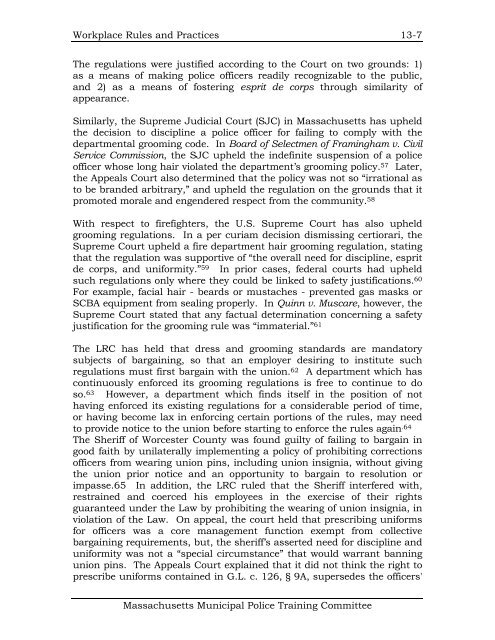Management Rights - AELE's Home Page
Management Rights - AELE's Home Page
Management Rights - AELE's Home Page
You also want an ePaper? Increase the reach of your titles
YUMPU automatically turns print PDFs into web optimized ePapers that Google loves.
Workplace Rules and Practices 13-7<br />
The regulations were justified according to the Court on two grounds: 1)<br />
as a means of making police officers readily recognizable to the public,<br />
and 2) as a means of fostering esprit de corps through similarity of<br />
appearance.<br />
Similarly, the Supreme Judicial Court (SJC) in Massachusetts has upheld<br />
the decision to discipline a police officer for failing to comply with the<br />
departmental grooming code. In Board of Selectmen of Framingham v. Civil<br />
Service Commission, the SJC upheld the indefinite suspension of a police<br />
oficer whose long hair violated the department’s grooming policy. 57 Later,<br />
the Appeals Court also determined that the policy was not so “irrational as<br />
to be branded arbitrary,” and upheld the regulation on the grounds that it<br />
promoted morale and engendered respect from the community. 58<br />
With respect to firefighters, the U.S. Supreme Court has also upheld<br />
grooming regulations. In a per curiam decision dismissing certiorari, the<br />
Supreme Court upheld a fire department hair grooming regulation, stating<br />
that the regulation was supportive of “the overal need for discipline, esprit<br />
de corps, and uniformity.” 59 In prior cases, federal courts had upheld<br />
such regulations only where they could be linked to safety justifications. 60<br />
For example, facial hair - beards or mustaches - prevented gas masks or<br />
SCBA equipment from sealing properly. In Quinn v. Muscare, however, the<br />
Supreme Court stated that any factual determination concerning a safety<br />
justification for the grooming rule was “immaterial.” 61<br />
The LRC has held that dress and grooming standards are mandatory<br />
subjects of bargaining, so that an employer desiring to institute such<br />
regulations must first bargain with the union. 62 A department which has<br />
continuously enforced its grooming regulations is free to continue to do<br />
so. 63 However, a department which finds itself in the position of not<br />
having enforced its existing regulations for a considerable period of time,<br />
or having become lax in enforcing certain portions of the rules, may need<br />
to provide notice to the union before starting to enforce the rules again .64<br />
The Sheriff of Worcester County was found guilty of failing to bargain in<br />
good faith by unilaterally implementing a policy of prohibiting corrections<br />
officers from wearing union pins, including union insignia, without giving<br />
the union prior notice and an opportunity to bargain to resolution or<br />
impasse.65 In addition, the LRC ruled that the Sheriff interfered with,<br />
restrained and coerced his employees in the exercise of their rights<br />
guaranteed under the Law by prohibiting the wearing of union insignia, in<br />
violation of the Law. On appeal, the court held that prescribing uniforms<br />
for officers was a core management function exempt from collective<br />
bargaining requirements, but, the sherif’s asserted need for discipline and<br />
uniformity was not a “special circumstance” that would warrant banning<br />
union pins. The Appeals Court explained that it did not think the right to<br />
prescribe uniforms contained in G.L. c. 126, § 9A, supersedes the officers'<br />
Massachusetts Municipal Police Training Committee
















